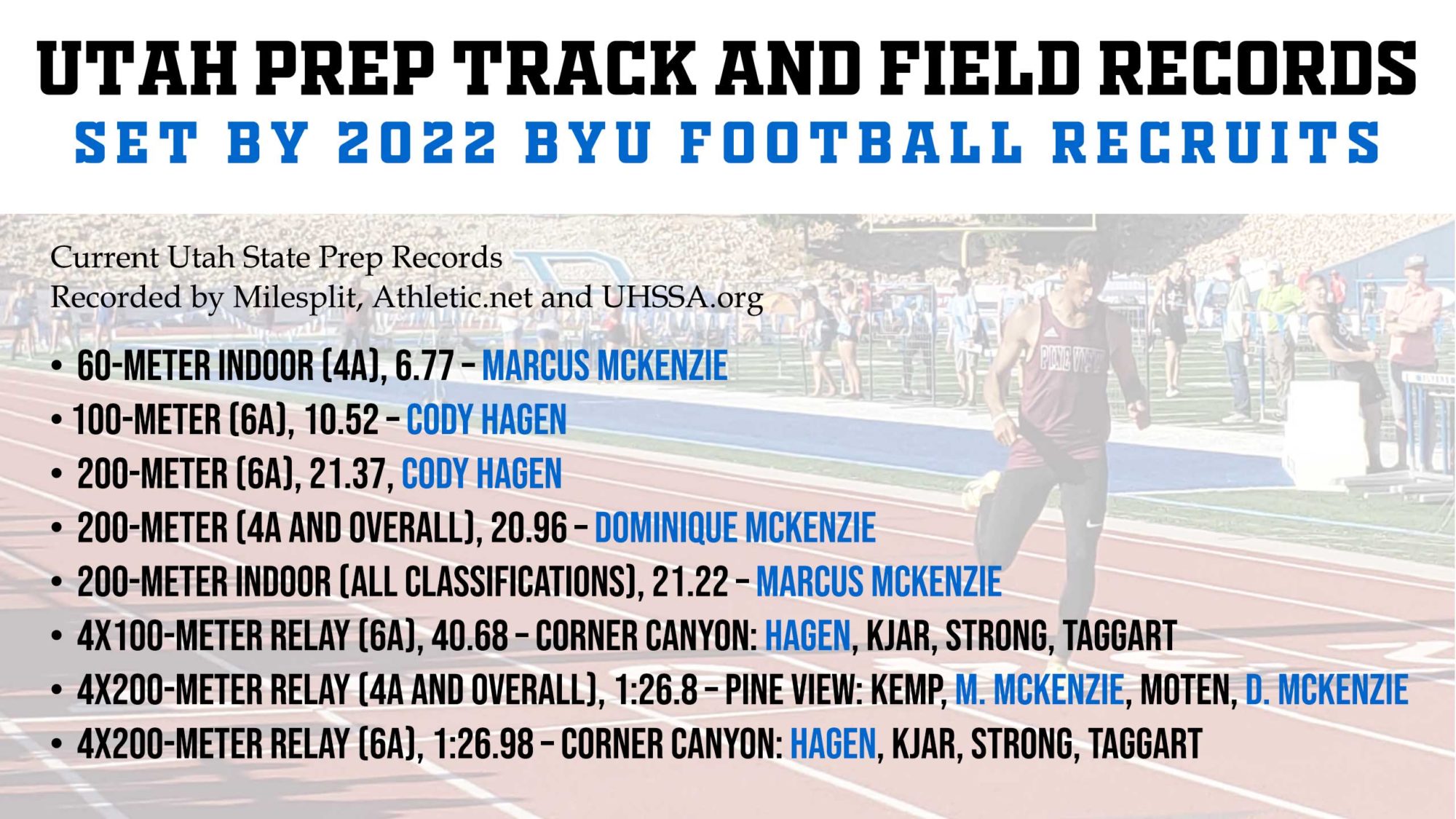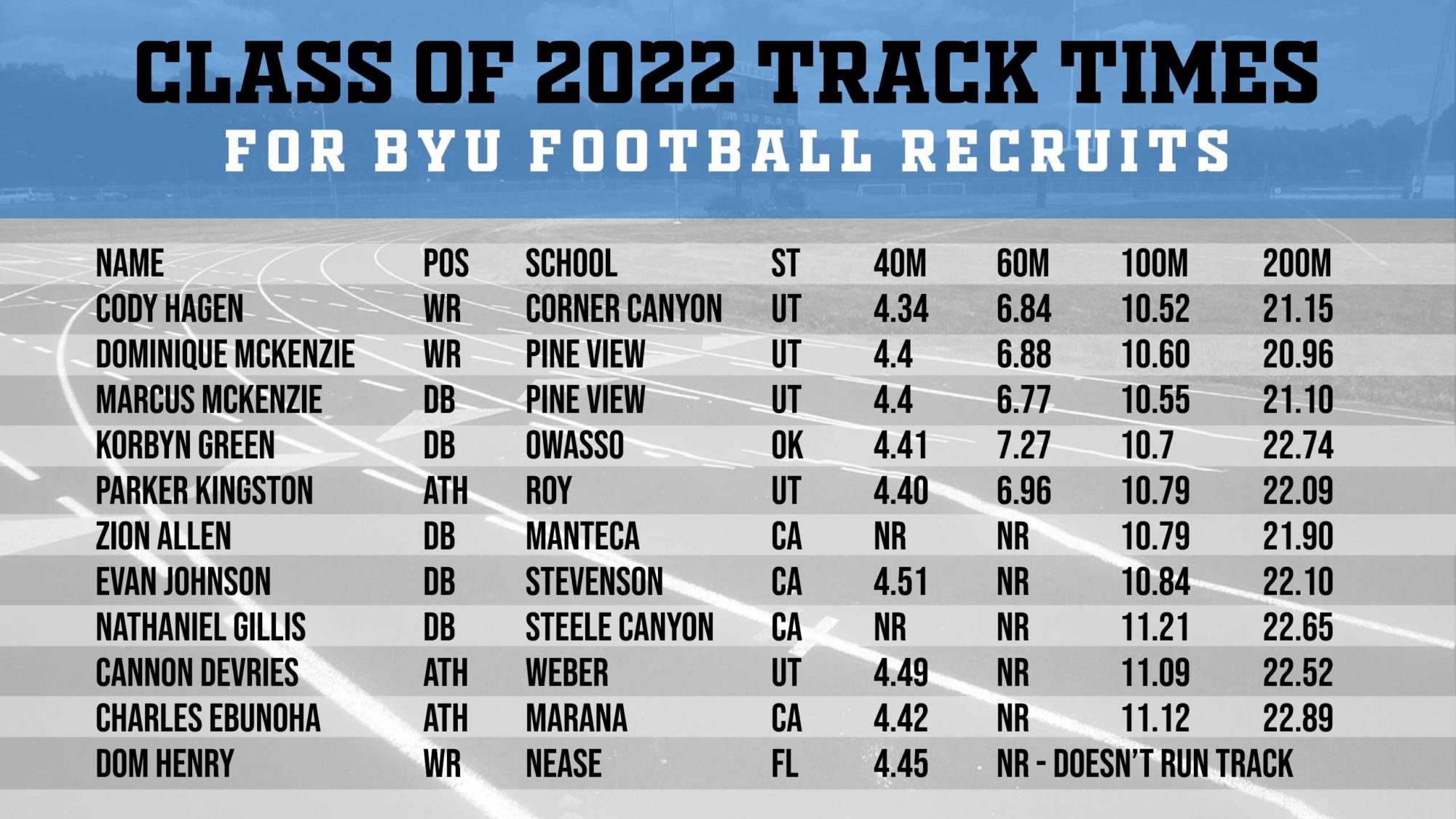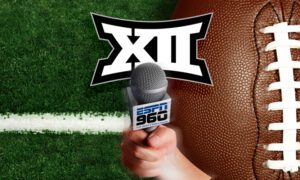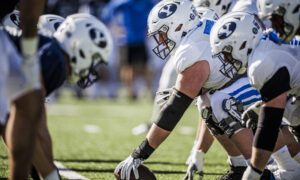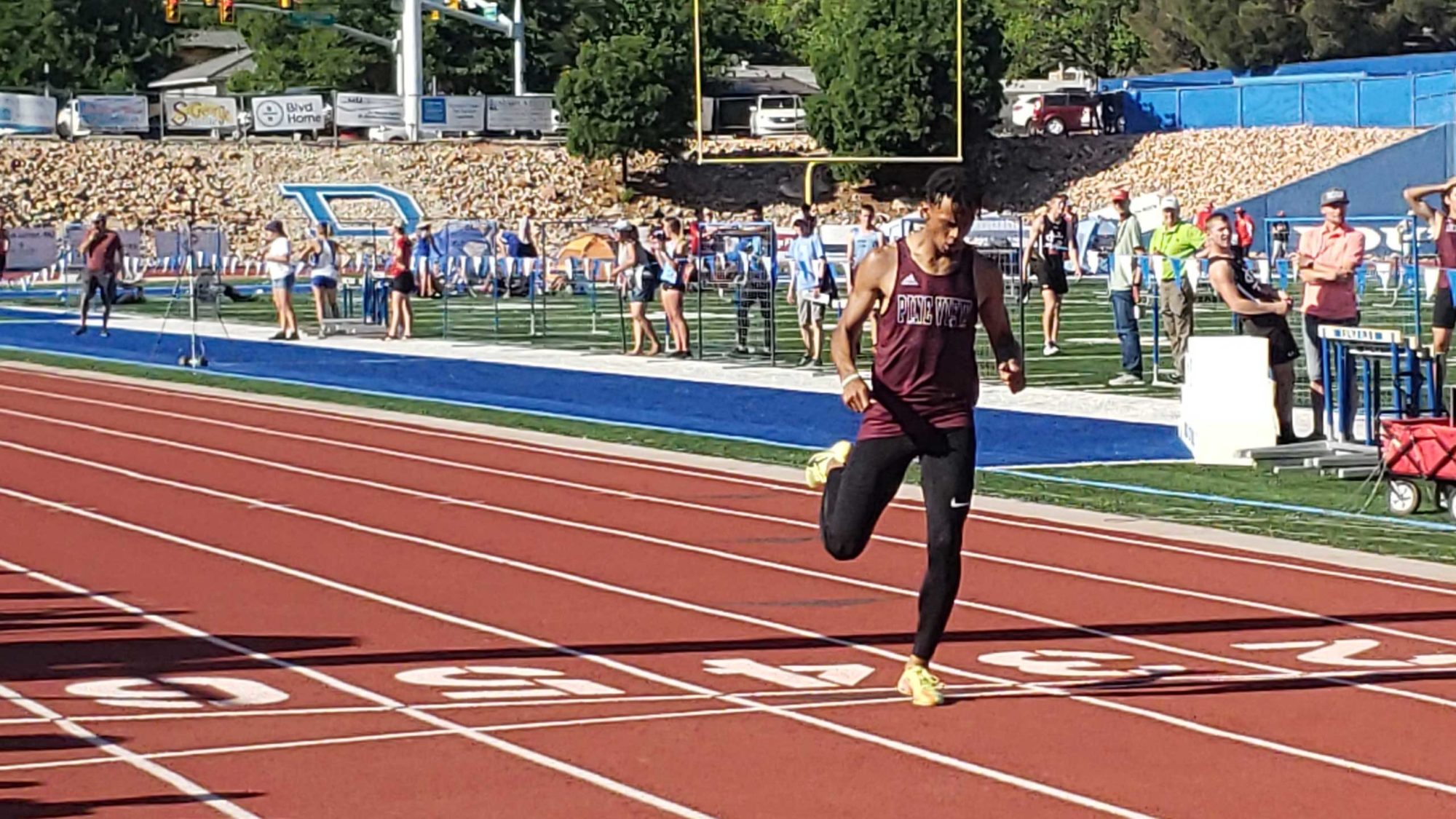
When the BYU coaching staff was evaluating team needs for 2022, they did what most schools do and looked at how to add faster players to the roster. The coaches likely didn’t set out to recruit BYU’s fastest class of all-time but it’s likely that’s what they did.
How should we measure speed for football players?
When it comes to measuring speed on the gridiron, there are a few factors that make it difficult to determine who is the fastest. Typically, we look at 40-meter times to establish football speed. But forty-yard times are often grossly exaggerated.
Indeed, a study done by SB Nation found that 77% of players in the NFL combine had forty-yard times that were the same or slower than their claimed high school times. The times for most college players dropped by nearly a tenth of a second after four to five years in a college strength and conditioning program.
This drop in speed might be attributed to adding muscle (and weight) but it is most likely that high school and even many college-timed 40s are not very accurate.
If we want to be more accurate, we can look at the 60-meter, 100-meter, and 200-meter times for those prep football players that also competed in track. Using those documented times in concert with reported 40 times gives a clearer picture of how fast the athlete truly is. As a general rule of thumb:
Let me break down 40 yard dash in track speed for y’all !!! I know speed just from watching someone run. I can tell you what he runs TRUST ME.
100 meter
4.6 = between 11.7 – 12.5
4.5 = between 11.0 – 11.7
4.4 = between 10.7 – 11.0
4.3 = between 10.4 – 10.6
4.2 = under 10.4— CoachJay – Elite 400 National Recruiting Expert (@CoachJayUConn) March 29, 2020
So, taking all track times under consideration, who are the fastest players to arrive and compete at BYU?
That’s a difficult question to answer for two primary reasons: lack of measuring speed prior to the 1980s, and track speed vs. field speed.
The 40-yard time has grown in importance to college and NFL recruiters in the past few decades, but prior to 1980 it was rare that any track times for football players were taken and recorded. So, comparing an athlete of the 1970s to one of the 2000s is a difficult proposition.
Additionally, it is clear that track speed doesn’t always translate over to football speed on the field for in-game situations. Running in pads is just not the same as running in short shorts and spikes.
Who are the fastest players to ever suit up for BYU?
Using the data that is available via the web, we can place players from the modern era (1980s to present) into general categories when it comes to speed.
Level 1: Fast. There have been some really fast players over the years recruited by the BYU football team. Indeed, some of BYU’s all-time greats spent a lot of time on the track in high school. For example, quarterback Taysom Hill (2012-2016) ran a 22.74 200-meter dash in high school, while running back Luke Staley (1991-2001) ran a 11.04 100-meter.
Those are incredibly fast times… but not when compared to the all-time fastest players at BYU.
Level 2: Really fast. Tyler Anderson (1988, 1991-93) was lightning. He broke the Utah state record for the 100 meters in high school with a 10.96 his junior year. He also broke the 200-meter record with a wind-aided 21.64. He was a great target at wide receiver for Heisman winning Ty Detmer. After his BYU career he ran a 4.65 forty at the NFL combine.
That is fast, but it doesn’t seem quite as fast when compared to BYU’s fastest running back of the 1990s—Ronney Jenkins. Jenkins (1996-98) ran a blazing fast 10.66 100-meter in high school, a 4.46 forty at the NFL combine, and a smoking 4.3 on his Pro Day. Jenkins had an incredible career at BYU, where he started as a backup to another really fast running back—Brian McKenzie (more about him later). Despite being a backup Jenkins rushed for 733 yards and scored 14 touchdowns as a freshman and was even more productive the following year. In the NFL he led the league in kickoff returns his second season and was selected as an alternate to the Pro-Bowl.
But as fast as Jenkins was for BYU, there were others that came along later that were even faster. Rod Wilkerson (2001-04) ran a 10.53 100-meter in high school and a 21.20 200-meter. He did both track and football at BYU and his high school times slipped a bit. He ran a 10.63 in the 100 for the BYU track team and 21.09 in the 200. He had over 1,000 yards as a receiver on the football team.
As Wilkerson wrapped up his BYU career, Todd Watkins (2004-05) stepped in as a transfer from Grossmont Jr. College where he clocked a 4.28 forty time. Wilkerson put up some big numbers for the Cougs. In two seasons he had 101 receptions for 1,720 yards and 15 touchdowns, and was then selected in the seventh round of the 2006 NFL draft after posting a 4.43 at the NFL combine.
Anderson, Jenkins, Wilkerson, and Watkins were fast, but the fastest BYU football players were dual sport athletes who prioritized track and field over football. LaVell Edwards recruited and Gary Crowton played a couple track stars in the early 2000s, but while they both excelled on the track they didn’t quite get the results BYU was hoping for on the gridiron.
Level 3: Super-duper fast. Cody Fonnesbeck (2000, 2003-06) ran a 10.54 100-meter time at Dixie high school in St. George, a school record and the second fastest prep time in Utah up to that point. He also ran a Utah prep record 4.21 forty at the Reebok combine in high school, and a 6.96 60-meter in indoor track. He got even faster at BYU, finding a place on BYU’s top 10 all-time in the 100-meter (10.37) and 60-meter (6.69). Despite his speed he was injury prone and made no impact for the Cougars on the football field.
Nate Soelberg (2003-05) ran a really fast 10.75 100-meter and 7.02 60-meter in high school and got to super-duper fast while at BYU. His personal best was a 10.34 in the 100 (which was tops in the MWC), 6.68 in the 60-meter, and a reported 4.21 forty. While at BYU he also ran a 21.64 200-meter. On the gridiron Soelberg had just 89 career tackles as a defensive back, with two tackles for loss, and six pass break-ups. His focus was clearly on track.
If you love our content, please support our sponsors. We can’t produce our show and articles without our sponsors. They are also an official sponsor of the BYU football team. This article is brought to you by Built Bar, built.com. Use “Criddle10” coupon code for 10% off your order.
Recruiting for Speed in the Independence Era
As Bronco Mendenhall took over for Crowton in 2006, the emphasis on speed took a back seat. Sure, there were a few fast recruits, but most of the fastest 40 times of the 2000s and 2010s came from players that were preparing for the NFL draft and hired trainers specifically to improve their forty times.
Mitch Mathews, Devon Blackmon, and Manoa Pikula each ran sub 4.5 forty time at the 2016 Pro Day. Jonah Trinnaman ran a 4.30 at his Pro Day in 2018, while Dayan Ghanwoloku and Aleva Hifo knocked out 4.41 at theirs in 2020. And last year three different players went sub 4.5 with Zayne Anderson recording a 4.43, Micah Simon posting a 4.34, and Chris Wilcox doing a 4.31.
This spring Tyler Allgeier hopes to go even faster than the 4.39 he recorded last year to position himself as one of the top running backs of the 2022 NFL draft.
But what about the incoming players?
BYU football’s three fastest prep recruits
The question isn’t whether or not the incoming class of 2022 is fast, it’s how fast? Is this the fastest recruiting class that BYU has ever had?
By the numbers the answer is clearly yes.
There are ten recruits in this class that have run a 4.5 or faster forty-time. Most of those own their school’s records in the 100-meter dash and several have state records as well. But there are three that stand apart.
Three incoming student-athletes have faster high school track times than any other BYU recruits ever, and these three haven’t even run their senior seasons yet—the high school track season starts this week.
Remember Brian McKenzie, the really-fast running back that started ahead of Ronney Jenkins in the 1990s?
Well, it just so happens that he married a track star—Salote—while they were at BYU. Fast forward a couple decades and they have children who are athletes. Their two oldest children are fast, and I’m not talking just fast or really-fast. I mean they are super-duper fast.
Marcus and Dominique McKenzie started running at the age of eight or nine and started playing football a few years later. They really good at both sports. And they are coming to Provo as legacy recruits.
So is another young man who is super-duper fast, whose father was also really great at sports. Sean Hagen signed with the Pittsburg Pirates after being selected in the 1993 MLB draft, but he was a pretty amazing football player too. The 1992 Utah Gatorade player of the year gave up his football/baseball scholarship to the University of Utah to enter the minor leagues. After spending a few years with the Pirates, he came back to Utah and spent one season play football for the Utes and caught one pass for 18 yards.
Nearly thirty years later his son Cody followed in his father and older brother’s footsteps, being named the Utah Gatorade player of the year as a standout receiver. Cody passed on track scholarships to play football for the Ute’s rival—Brigham Young University.
BYU doesn’t land too many Utah legacy recruits, but the last time they did it turned out great for both BYU and the recruit. That recruit—NFL starter Zach Wilson—wasn’t even offered by Utah. Hagen was, but the no. 4 recruit in Utah still chose BYU.
Marcus, Dominique, and Cody each have run a 10.6 or faster 100-meter, a 21.15 or faster 200-meter, and a 6.88 or faster 60-meter time. All of these marks equal or are faster than the two fastest BYU recruits prior to 2022—Fonnesbeck and Soelberg—and most are Utah state records.
It is also interesting to note that Wilkerson still has a Utah state record in the 4x100m relay, while current BYU football players Blake Freeland (shot put) and Puka Nacua (long jump) also have state records.
So, by the numbers, the three fastest recruits in the history of BYU football are all coming in as part of the class of 2022.
What makes this even more incredible is how outstanding McKenzie, McKenzie, and Hagen performed on the football field over their prep careers.
Granted, Fonnesbeck and Soelberg were great prep football players as well. Soelberg was second-team All-State in football and was recruited by Utah State, Weber State, and Utah. Fonnesbeck was sensational in both track and football. He caught 69 passes for 1,526 yards and had 901 kickoff return yards as a senior while being named first-team all-state and leading 3A Dixie high school to a state title.
This year’s recruits are equally impressive.
Marcus McKenzie had 62 solo tackles, six tackles for a loss, and an interception as a junior. He received scholarship offers Cal, Pitt, and Virginia.
Dominique McKenzie had 84 receptions for 1719 yards and 18 touchdowns as a junior, ranking no. 4 nationally in total yards receiving in 2020. He also had 649 kickoff return yards and was rate 4-stars by ESPN. His scholarship offers included Oregon, Arizona, Pitt, and Virginia.
Cody Hagen is BYU’s highest rated recruit for the class of 2022. He had 89 receptions for 1805 yards and 23 touchdowns as a senior, leading the state in receiving yards and ranking no. 4 nationally. Hagen was named to the MaxPreps All-America second-team for the second year in a row, was the Deseret News Mr. Football, and the Gatorade Player of the Year. As a 4-star recruit his scholarship offers included Michigan, Oregon, Stanford, and Utah.
Clearly Hagen and the McKenzie brothers are both fast and accomplished on the football field, and have set the standard for speed.
What is less clear is the kind of impact they will each make on the football field.
A Class full of track stars
The Class of 2022 has several others who qualify as level 2 (really fast) recruits. DB Korbyn Green (Owasso, OK), ATH Parker Kingston (Roy, UT), DB Evan Johnson (Stevenson, CA), DB Zion Allen (Manteca, CA), DB Nathaniel Gillis (Steele Canyon, CA), WR/DB Cannon DeVries (Weber, UT), ATH Charles Ebunoha (Marana, CA), and WR Dom Henry (Nease, FL) have all recorded sub 4.50 forty times.
That’s right, BYU has ELEVEN recruits for the class of 2022 that run under 4.5!
Green (10.7), Kingston (10.79), Johnson (10.84), and Allen (10.89) have all gone under 11 seconds in the 100-meter. All but Henry have recorded sub-23 200-meter times, and Henry hasn’t simply because he doesn’t run track.
These are fast recruits. Yet most of them are coming to BYU under-the-radar. Much like the Edwards/Crowton experiment of the early 2000s, Sitake and company are looking to develop some unheralded football recruits that are stars on the track.
The 2022 track season starts today and it is likely that many of these recruits will have even faster times, more team records, and more region, district and state titles when they arrive in Provo this summer.
Is this the fastest BYU recruiting class of all-time?
Yes. And it might get even faster.
If you love our content, please support our sponsors. We can’t produce our show and articles without our sponsors. They are also an official sponsor of the BYU football team. This article is brought to you by Built Bar, built.com. Use “Criddle10” coupon code for 10% off your order.





